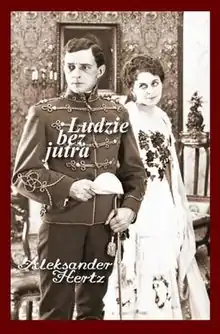| Ludzie bez jutra | |
|---|---|
 Poster for the film | |
| Directed by | Aleksander Hertz |
| Written by | Stanislaw Jerzy Kozlowski |
| Starring |
|
Production company | Sfinks |
Release date | 1921 |
| Country | Poland |
| Language | Silent (Polish intertitles) |
Ludzie bez jutra (English: People with no Tomorrow, it was also shown under several English titles, among them At the Time of the Czars and The Bartenieff Affair)[1] is a 1921 Polish silent film by director Aleksander Hertz. The film was considered lost for almost a hundred years before being rediscovered in Germany in 2015.[2][3][4]
Production
The film has been considered to be among several films made in the 1910 and 1920s which were playing off of anti-Russian feelings in Poland during that time. The film was the last film made by director Aleksander Hertz before Polish independence from Russia.[5]
Plot
The film is based on the real life ill-starred love affair between Polish actress Maria Wisnowska and Russian cavalry officer Alexander Bartenev. The affair led to Bartenev eventually killing Wisnowska as part of a suicide pact.[6]
Reception
The film was met with negative reactions upon its release, it became controversial with both government censors and general audiences for portraying the events of the murder realistically. The controversy brought the studio Sfinks into a public scandal.[7]
See also
References
- ↑ Ford, C.; Hammond, R. (2009). Polish Film: A Twentieth Century History. McFarland, Incorporated, Publishers. p. 303. ISBN 978-1-4766-0803-7. Retrieved 19 September 2017.
- ↑ Dłużewska, Emila (14 December 2015). "Kino Iluzjon: zaginiony film po ponad 100 latach wraca na ekran". Wyborcza.pl. Retrieved 18 September 2017.
- ↑ M. Nieciecka Mac (15 December 2015). "PREMIERA PO LATACH: LUDZIE BEZ JUTRA - FILM NIEMY Z MUZYKĄ NA ŻYWO (SZA/ZA)". Radio Kraków. Archived from the original on 18 September 2017. Retrieved 18 September 2017.
- ↑ Skaff, S. (2004). The history of cinema in Poland and the transition from silent to sound film, 1896-1939. University of Michigan. p. 49. ISBN 9780496851133. Retrieved 19 September 2017.
- ↑ Ford, Charles; Hammond, Robert (11 September 2009). Polish Film: A Twentieth Century History. McFarland. p. 24. ISBN 9781476608037. Retrieved 18 September 2017 – via Google Books.
- ↑ "Rediscovered Polish film set for 21st century premiere". thenews.pl. Radio Poland. 11 December 2015. Archived from the original on 18 September 2017. Retrieved 5 February 2017.
- ↑ Skaff, Sheila (2008). The Law of the Looking Glass: Cinema in Poland, 1896-1939. Polish and Polish American Studies. Ohio University Press. p. 65. ISBN 978-0821417843. Retrieved 19 September 2017.
Further reading
- "People With No Tomorrow (1921)". Filmuforia. 9 April 2016. Archived from the original on 18 September 2017. Retrieved 18 September 2017.
- Sidorska, Hanna (14 December 2015). "Skandaliczne dzieło wraca do kin. To polski film". Fakt.pl. Archived from the original on 18 September 2017. Retrieved 18 September 2017.
- ""Ludzie bez jutra" z muzyką na żywo w Iluzjonie". Onet.pl. 10 December 2015. Archived from the original on 18 September 2017. Retrieved 18 September 2017.
- "Sensacyjna historia filmu "Ludzie bez jutra"". Polskieradio.pl. 28 July 2016. Archived from the original on 18 September 2017. Retrieved 18 September 2017.